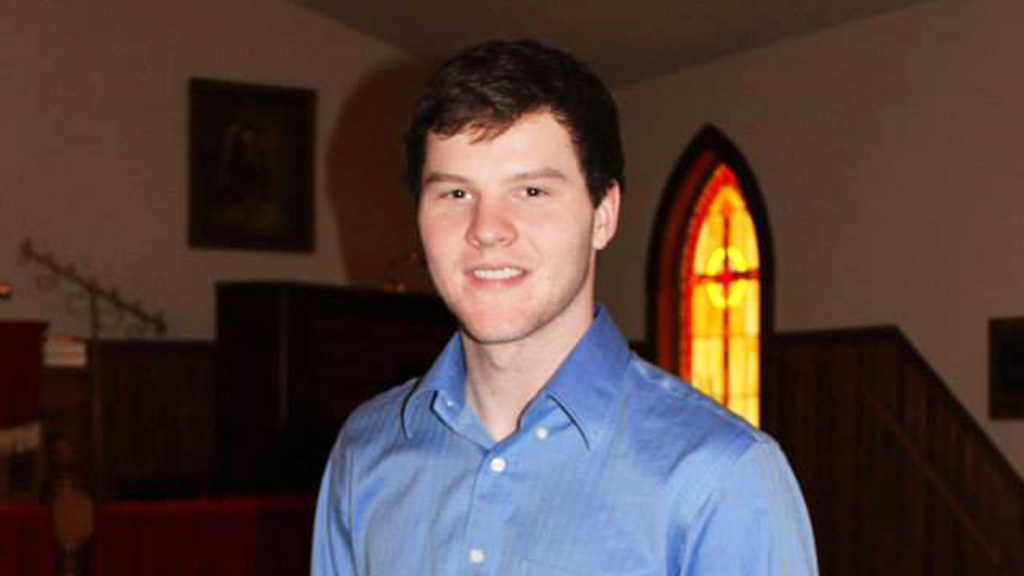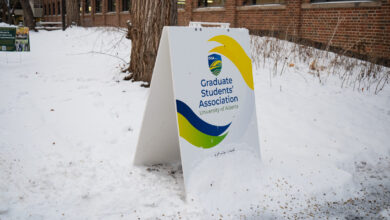Campus mourns dodgeball champ
 Supplied
SuppliedKnoxville’s Tavern on Jasper Avenue isn’t usually renowned for creating lasting romantic relationships, but Laurin Hartley and Carter Corrigan kindled love within its unlikely walls.
He finally made a move on her at the country bar on Jan. 10, 2013. The two University of Alberta first-years met at Lister’s Dodgefest tournament a few months prior.
“Laurin, are you wearing fake eyelashes?” he pressed.
“No. No I’m not,” she replied.
“Close your eyes. Prove it.”
She closed her eyes and he planted a kiss on her lips — their first kiss. The two marked this as the moment they started their relationship. Just shy of two years together, it came to a sudden end when Corrigan died shortly before Christmas.
Corrigan, a third-year chemical engineering student, and his childhood best friend, Eli Gosselin, were killed in a rollover northeast of High River, AB on Dec. 20.
Corrigan lived in Lister Centre for his first and second year and was well-known as the residence’s dodgeball legend. In the 2013-14 season, he became the first person in the Lister Dodgeball League’s history to win all three MVP awards (male, all-star and playoff) in one year.
Kyle Bietz was a second-year student returning to 7 Mackenzie when he first met Corrigan, and he could tell by Corrigan’s very first dodgeball practice that he was going to be an all-star in the game. A former quarterback in high school, Bietz said he was “very smart” on the court.
“Everybody loved to hate our floor that year and as much as others hated to play against Carter they still loved him,” he said. “I felt like a mentor to him, but he was a far better athlete so I often found myself looking up to him.”
Though he was one of the best in the sport, Corrigan’s friend Keifer Paulgaard said he was admirably humble about it.
“Not only was he an amazing player, but also the most modest and honest,” Paulgaard said. “Carter was a great friend and phenomenal teammate. Although I only knew him for a few years, his attitude and skills, both on and off the court, are something I can only wish to aspire to.”
Corrigan absorbed himself with athletics in his free time, playing recreational hockey, watching football, going to the gym. His Facebook page is still plastered with photos of him hurling dodgeballs across the gym and smug shots of him posing in his LDR jersey, his team captain’s “C” proudly monogrammed on his shoulder.
Behind this jock persona existed a bright mind. At 19 years old, Corrigan was one year younger than most of his classmates, but had a huge knack for numbers, and scored a perfect 100 per cent on his Math 30 diploma. Hartley remembers, with a giggle, of Corrigan being shocked that she didn’t have the full numbers on her credit and debit cards memorized like he did.
“You could give him huge multiplication and division equations and he could throw (the answer) at you in about three seconds,” she said.
Bietz, who called Corrigan a “boy genius,” recalled often walking into his room on the night before a midterm, to find him watching a movie or hanging out with his roommates.
“Don’t you have a midterm tomorrow?” Bietz would ask.
“Yeah, so?” Corrigan would reply.
Sure enough, he would always ace the test anyway.
Corrigan’s friends also remember his wicked sense of humour. Bietz wasn’t immune to being “chirped” by Corrigan about walking pigeon-toed or for his collection of boat shoes, and Paulgaard said Corrigan got every guy on campus he knew to call each other “dad.”
“It just goes to show how big of an influence he was on the people around him,” Paulgaard said. “I know I’m proud to call Carter Corrigan my dad.”
Like most third-years, Corrigan didn’t have incredibly detailed plans for the future. But, he talked about getting MBA after his undergraduate degree and eventually moving to the mountains with Hartley.
In between memories of him being a goofball, campus dodgeball celebrity and math whiz, one trait of Corrigan’s stands out for Hartley: his big heart.
“He always had time for everyone and made everyone feel special. If someone had an insecurity, he had the ability to take it away from them and make them feel good about themselves,” Hartley said. “He just lit up the room.”





Great individual. Live big in heaven Carter, I know you will big guy <3.